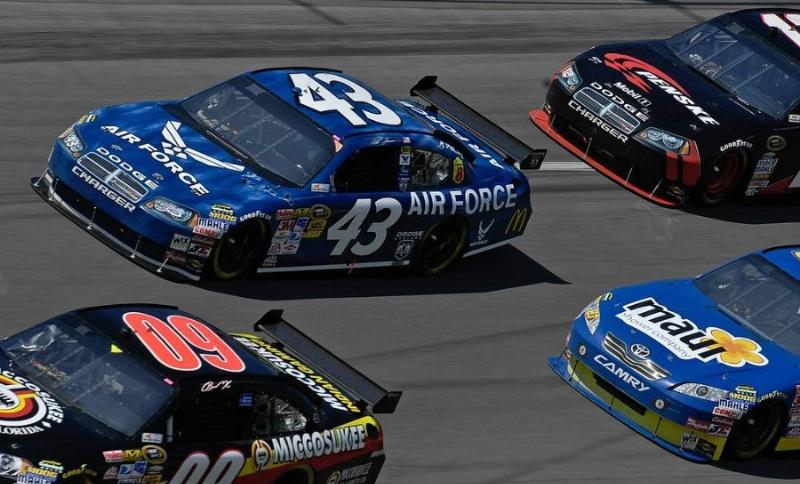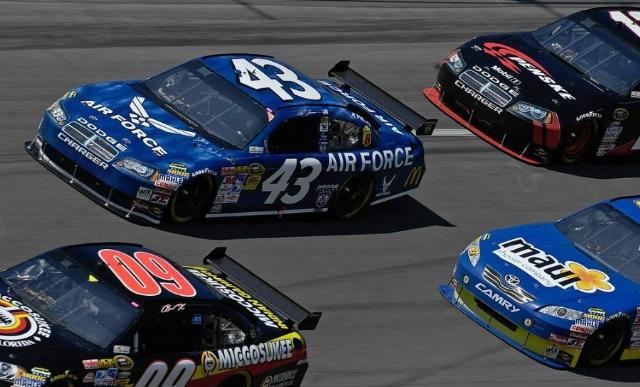


We got into NASCAR this last year because my grandson loves it and my wife and I wanted to have something to share with him. I knew nothing of the racing sport other than the narratives that are out there — that NASCAR fans are all rednecks, that people watch races only for the crashes, that it isn’t a big deal, always turning left. Some have even said racing is mostly staged, that it’s like professional wrestling, with scripted characters. Like most narratives that are out there, I found these false.
What I learned on this journey thus far is that there are few sports as American as NASCAR. I’m not talking about the origins of NASCAR, with bootleggers racing their cars on Daytona Beach. What my wife, grandson, and I have experienced is something far more.
NASCAR is about love of country. It’s about family. It is about all that is good in our nation.
Unlike other sports, NASCAR racers engage with their fans. Yes, sometimes you have to buy some merch to get time with a racer, but most are more than willing to stop what they are doing and sign a card or answer a question. While we were at the Brickyard 400, my grandson got to meet and fist bump with over a dozen of his favorite drivers. When was the last time a football or baseball player stopped for an hour just to answer questions from fans? NASCAR drivers understand what they are: sports competitors who are adored (and in some cases hated) by enthusiasts.
Every race begins with a non-denominational prayer. When it happens, you see thousands of people take off their hats and pray. There is always a ceremony to honor America’s military. There’s a flyover by the military. When the National Anthem is sung, people sing along. There’s no bending the knee, no grotesque displays around a social issue. The people there don’t come for that. They come for the competition.
I thought it would be harder to get into the racing, but it wasn’t difficult at all. Like all sports, there are tons of statistics that can come into play, but if you are just starting out, you don’t need to know any of that. The races are in stages, which breaks up the action like a seventh-inning stretch. There are strategies about tires, fuel consumption, when to pit, and other things that are relatively easy to understand after a race or two. My family is still learning all of it, guided by my grandson.
You don’t have to have a favorite driver. They are not cardboard characters. Some are hated and even booed when they are introduced, but when they win, everyone cheers. Good sportsmanship is part of racing and goes beyond the drivers to the fans.
The race itself is a mix of strategies, cars, and the endurance and skill of the drivers. It’s not about just turning left. Some tracks are road courses, which are high-speed turns in both directions, all designed to test a driver’s mettle. Our last race in Indianapolis was with 96--degree weather and full humidity, and that was in the stands. On the track, it was well over a hundred degrees. The drivers, in full suits, roasted for three and a half hours. Anyone thinking this is some lightweight sport is deluding himself. This is a test of skill and endurance.
The drivers are most often not there alone. They bring their wives and kids with them. There is something wholesome about that. It humanizes them and reminds watchers that they are people. It also makes a statement about NASCAR in general, that it is a sport for families to enjoy.
The myth that only hillbillies and rednecks watch NASCAR is a lie as well. Sure, they are represented, but NASCAR doesn’t exclude anyone. If you attend a live race, which I encourage you to do, you will meet with people from every socioeconomic class. They are also some of the nicest fans I’ve ever met at a sporting event. At least a half dozen asked me at the Brickyard 400 whom I was rooting for, where I was from, was this my first race? They weren’t nosy; they were just being good fans and stewards of the sport.
NASCAR is the epitome of an American sport. In some ways, it surpasses baseball and football because it is not about the money, but about the fans. It is patriotic and family-centric. If you haven’t experienced it, I encourage you to do so. I don’t think you’ll be disappointed.
Blaine Pardoe is a New York Times bestselling and award-winning author canceled by one of his publishers in 2022. His conservative political thriller series, Blue Dawn, is the story of the violent overthrow of the government by radical progressives. His new series, Tenure, is about a Punisher-like hero who goes after the woke. He also authors the bestselling military science fiction series Land&Sea.

Image via Picryl.
